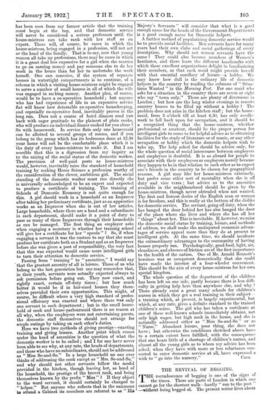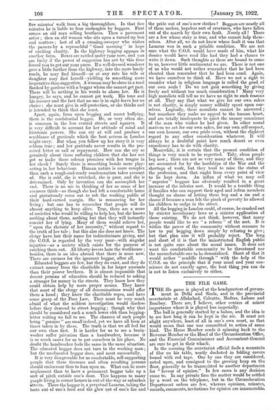THE REVIVAL OF BEGGING.
THE recrudescence of begging is one of the signs of the times. There are parts of London in which one cannot go for the shortest walk—hardly " run to the post " —without being begged of. The present writer lives about five minutes' walk from a big thoroughfare. In that five minutes he is liable to four onslaughts by beggars. First comes an old man selling bootlaces. Then a pavement artist ; then an old woman who sits upon a turned-up box and mutters; last of all a crossing-sweeper who wishes the passers-by a reproachful " Good morning " in hope of exciting charity. In the highway begging appears in another form. Boxes are rattled under your nose, and you are lucky if the power of suggestion has not by this time forced you to get out your purse. If a well-dressed wanderer goes a little further from the highway, into the more lonely roads, he may find himself—or at any rate his wife or daughter may find herself—yielding to something more imperative than suggestion. A woman maybe alone in a road flanked by gardens with a beggar whom she cannot get past. There will be nothing in his words to alarm her. He is hungry, he says, and he cannot get work. His tone and his manner and the fact that no one is in sight leave her no choice ; she must give in sell-protection, or she thinks and is intended to think that she must.
Apart, again, from open begging and secret bullying, there is the confidential beggar. He, or very often she, is common in the less central streets and squares. It is very difficult to account for her attitude of mind and histrionic powers. She can cry at will and produce a semblance of gratitude which the best actress in London might envy. But when you follow up her story it is very seldom true ; and her gratitude never results in the pro- mised letter or call or repayment. How can she cry so genuinely about those suffering children that she has not got or make those solemn promises with her tongue in her cheek I Surely there is something beside mere play- acting in her behaviour. Human nature is more complex than such a rough-and-ready condemnation takes account of. She is cold, she is wretched, she is poor, and she is determined. Only by invention can she accomplish her end. There is no use in thinking of her as some of her accusers think—as though she had left a comfortable home and gratuitously come out to rob the working public of their hard-earned margin. She is romancing for her living ; but one has to remember that people will do almost anything to keep alive. True, there are a score of societies who would be willing to help her, but she knows nothing about them, nothing but that they will instantly convict her of lying. Many of them would relieve her, " upon the rhetoric of her necessity," without regard to the truth of her tale ; but this also she does not know. The clergy have lost their name for indiscriminate giving, and the C.O.S. is regarded by the very poor—with singular injustice—as a society which exists for the purpose of catching them out. All liberty-lovers hate the workhouse ; besides, there is an idea abroad that there is none now. There are excuses for the ignorant beggar, after all. Educated beggars are few, but they do exist, and they do extract money from the charitable in far larger amounts than their poorer brethren. It is almost impossible that decent persons of education should be reduced to asking a stranger for money in the streets. They know how they could obtain help by more proper means. They know that most of the clergy of all denominations would offer them a hand ; they know the charitable ropes, and have some grasp of the Poor Law. They must be very much afraid of what the mildest investigation would disclose before they descend to street begging ; though why that should be considered such a much lower ebb than begging- letter writing we fail to see. The chances of such people being " genuine " are small indeed, yet we have all been at times taken in by them. The truth is that we all feel for our own class first. It is harder for us to see a brain- worker suffer privation than a handworker, because it is so much easier for us to put ourselves in his place. No doubt the handworker feels the same in the same situation. The educated beggar does not turn to the working man ; but the uneducated beggar does, and most successfully. It is very disagreeable for us comfortable, self-supporting people that these tiresome and often revolting persons should endeavour thus to lean upon us. What can be more unpleasant than to have a permanent beggar take up a sort of pitch outside one's door. This happens to many people living in corner houses in out-of-the-way or suburban streets. There the beggar is, a perpetual Lazarus, taking the taste out of one's food and the glow out of one's fire and the pride out of one's new clothes ! Beggars are nearly all of them useless, hopeless sort of creatures, who have fallen out of the march by their own fault. Nearly all ! There are a few whose story is true, and who cannot help them- selves. After all, we do not know whose fault it was that Lazarus was in such a pitiable condition. We are not sure what the C.O.S. would have made of him, what his dossier would have read like had they had a chance to write it down. Such thoughts as these are bound to come to us, however little sentimental we are. There is not one of us who would not rather remember that he had been cheated than remember that he had been cruel. Again, we have ourselves to think of. Have we not a right to consider what in religious language is called the good of our own souls ? Do we not gain something by giving freely and without too much consideration ? Many very high moralists will tell us we have no right to such reasons at all. They say that what we give for our own sakes is not charity, is simply money selfishly spent upon our- selves. Logically, these moralists cannot be answered ; but somehow they make no appeal to the human heart, and are totally inadequate to quiet the uneasy conscience of the man who wishes he had given. In other moral matters we act for our own sakes, for our own self-respect, our own honour, our own pride even, without the slightest regard to any other consideration whatever. It will always be a doubtful point how much desert or even expediency has to do with charity.
Meanwhile, it is certain that the present condition of things is very much to be regretted. Tidy, clean people beg now ; there are not so very many of them, and they are accounted for by the hardships of the War and the shortage of work, but they tend to raise the status of the profession, and that ought from every point of view to be kept down. An influx of what we may call " superior beggars has obviously resulted in a great increase of the inferior sort. It would be a terrible thing if families who can support their aged and infirm members thought no shame of letting them beg and a sin and a shame if because a man felt the pinch of poverty he allowed his children to cadge in the street. All the begging in London could, of course, be crushed out by stricter mendicancy laws or a stricter application of those existing. We do not think, however, that many people would like to see " a reform " of the sort. It is within the power of the community without recourse to law to put begging down simply by refusing to give ; but that plan also it will probably reject. The long and short of it is that the uninstructed English public is not quite sure about the moral issues. It does not want the comfortable community to be threatened nor the uncomfortable one to be demoralized. Short of that it would rather " muddle through " with the help of the C.O.S. on the principle that if your mind and your con- science do not exactly agree, the best thing you can do is not to listen exclusively to either.



































 Previous page
Previous page